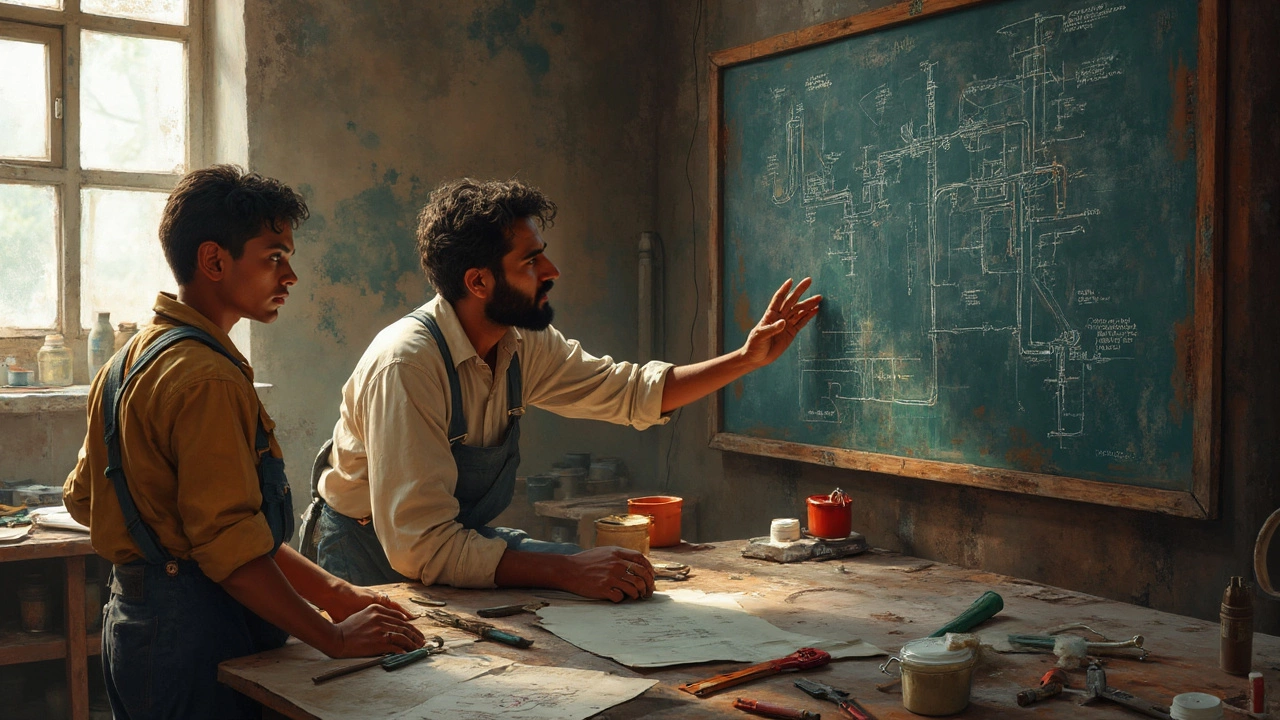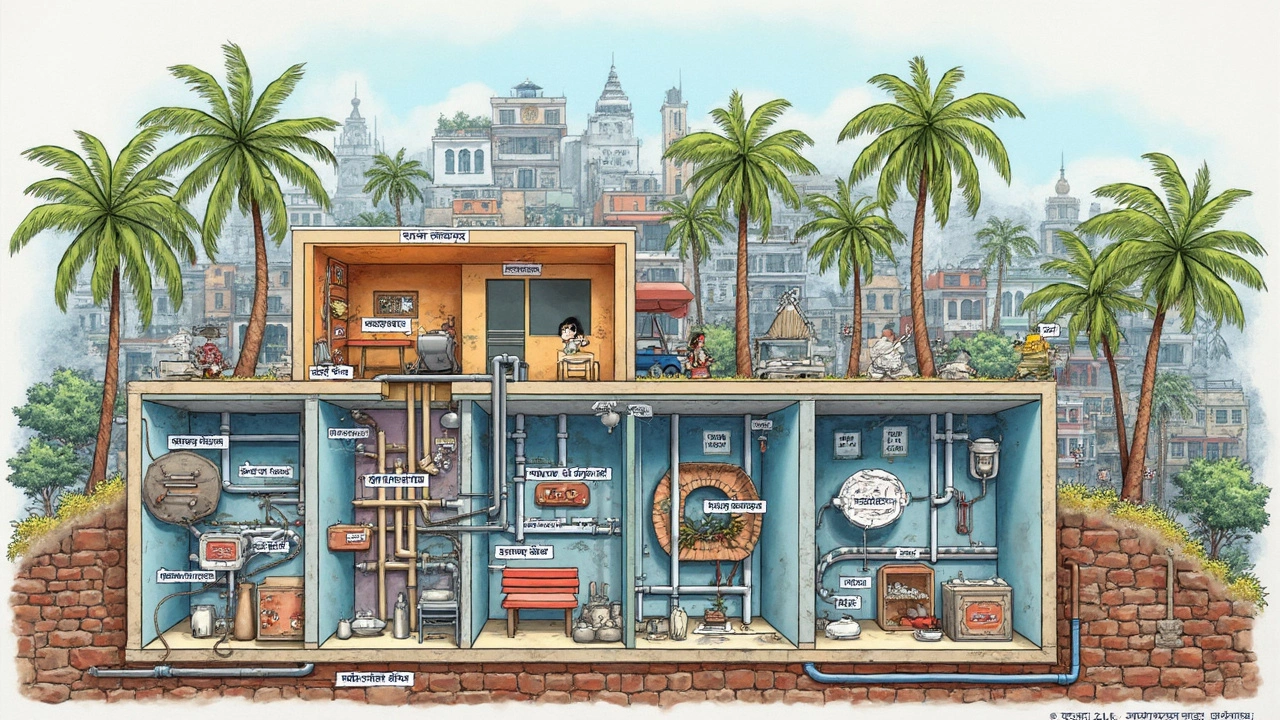
So, you're thinking about dipping your toes into plumbing and wondering if it's tough to learn. Well, you're not alone! A lot of folks are curious about just how challenging this trade really is. The thing is, plumbing isn't just about fixing leaky taps; it's a combination of problem-solving, technical know-how, and hands-on skills. It can seem a bit overwhelming at first, but with the right approach and training, anyone can get the hang of it.
Now, plumbing isn't something you just pick up overnight. It takes time and patience, like any other valuable skill. But here's the good news—there are tons of resources out there. From community college courses to apprenticeships, there's no shortage of ways to learn. And most importantly, the work is super rewarding. Nothing beats the feeling of solving a problem that's stumped you.
If you love working with your hands and don’t mind getting a bit messy, plumbing could be right up your alley. Plus, once you've mastered the basics, you'll have a skill that's always in demand. So, whether you're looking to make a career switch or just want to tackle those DIY projects with more confidence, learning plumbing might be easier than you think.
Getting Started with Plumbing
Jumping into the world of plumbing skills might seem intimidating, but starting out is easier than you think. The first step is understanding the basics—what makes plumbing tick. At its core, plumbing is about ensuring water goes where it needs to and that drainage is working smoothly. Think of it as the heart and veins of a building.
You don’t need to be a whiz with tools right off the bat. Many training courses offer beginner classes that focus on getting you comfortable with essential tools. You'll learn about wrenches, pipe cutters, and the different types of pipes used in residential and commercial plumbing systems. Starting with these basics builds a solid foundation as you progress.
Next, consider enrolling in a plumber training program. These range from short workshops to in-depth apprenticeships where you’ll work alongside experienced plumbers. An apprenticeship can last several years, but it’s a fantastic way to gain hands-on experience while earning. It’s like learning to drive—reading the manual isn't enough; you've got to get behind the wheel.
You can also dive into online resources. Video tutorials and simulation programs offer visual guides that can be really helpful for understanding complex systems. They've become surprisingly realistic and can supplement what you learn in class or on the job.
As for qualifications, many regions require plumbers to be licensed. This usually means passing an exam that covers both practical and theoretical aspects of plumbing. Some states or countries might also have specific certifications required for specialized work, like gas fitting. Make sure to check the regulations in your area to know what's needed.
- Start with basic tool knowledge
- Consider accredited training courses
- Pursue an apprenticeship for real-world experience
- Use online resources for additional learning
- Understand local licensing requirements
So, if you're ready to roll up your sleeves and tackle proper learning plumbing, getting started is all about taking one step at a time. Before long, you'll be navigating pipes and fittings like a pro, setting the stage for a fulfilling career.

Tools of the Trade
Diving into the world of plumbing calls for a trusty set of tools. After all, having the right gear can make or break your day. Let's go over some essentials, especially for folks just starting out in plumbing or those already in plumber training.
First up, the humble wrench. Plumbers have a special bond with wrenches, and it's not just one type. There's the adjustable wrench, perfect for dealing with all sorts of nuts and bolts. Then, you’ve got the pipe wrench, known for its tight grip on pipes, a crucial tool in the bag.
The plunger is another underestimated hero, but it’s crucial for anyone working on household drains and toilets. If you're planning to tackle any drain-related issues, having a plunger on hand is a must. Trust us, it's way more effective than those chemical drain cleaners.
Next, let’s talk about pipe cutters. They come in different sizes, and being able to cut pipes cleanly is vital. Whether you're dealing with copper or PVC, a good pipe cutter can save you a ton of hassle down the line.
Also, look at the tape measure. Sounds basic, right? But accurate measurements are half the battle in plumbing. Without them, you risk having to redo a lot of your hard work. Keeping one handy at all times is non-negotiable.
Here’s a quick glimpse at some other important tools:
- Basin Wrench: Great for those hard-to-reach nuts under sinks.
- Plumber’s Tape: Helps seal pipe threads to avoid leaks.
- Hand Auger: A savior for clogged sinks.
- Tube Bender: Essential for bending pipes without kinking them.
Now, let's look at a bit of data. According to industry surveys, tools alone can represent around 10-20% of a plumber's total work cost.
| Tool | Estimated Cost |
|---|---|
| Adjustable Wrench | $15-$30 |
| Pipe Wrench | $25-$40 |
| Pipe Cutter | $10-$20 |
So yeah, outfitting your toolkit might take an initial investment, but it’s worth it. Good tools don't just help you work more efficiently—they actually teach you a lot about the plumbing skills that you’re building. So, gear up and embrace the learning curve!

Roadmap to Mastery
If you're serious about mastering plumbing, having a clear roadmap is key. Let's start with formal education; it’s like the foundation of a house. Consider enrolling in a plumbing course at a technical school or community college. These courses will introduce you to essential concepts, and you'll get hands-on practice.
Next up, apprenticeships. These are gold because you get to learn directly from experienced plumbers while on the job. You'll not only pick up technical skills but also learn the tricks of the trade that aren't in textbooks. Typically, an apprenticeship lasts about 4 to 5 years and usually combines paid work with classroom instruction.
- First Year: Concentrate on basics like tool handling and plumbing codes.
- Second and Third Years: Get deeper into more complex systems and start understanding industrial installations.
- Final Years: Focus on specialization like gas fitting or advance into managerial skills for those looking to lead crews.
As you progress, certifications and specialized licenses come into play. Having the right credentials helps you stand out and can open doors to higher-paying jobs. Plus, they're required by law for certain plumbing tasks.
Don't forget the power of staying updated. Plumbing tech and codes change, so be sure to continue learning even after getting licensed. Join a professional organization or participate in workshops. The American Society of Plumbing Engineers, for instance, offers resources and networking opportunities that can boost your career.
Finally, developing strong communication skills is vital. Whether explaining a problem to a client or coordinating with a team, being clear and effective in your communication sets you apart.
This roadmap might not be short, but taking these steps seriously can lead to a successful and satisfying career as a plumber. Keep at it, and remember, every skilled plumber today was once a newbie!
